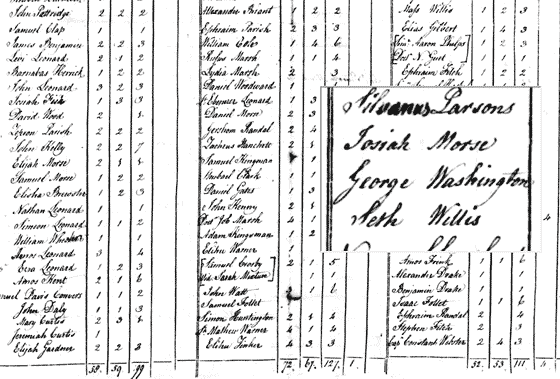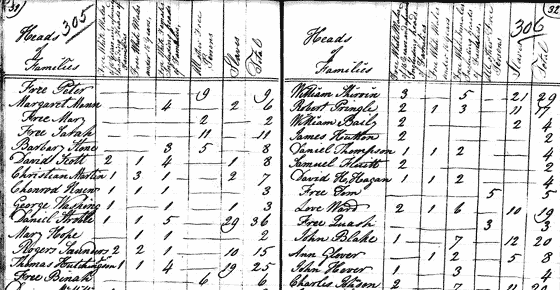| |
President George Washington
George Washington was born in 1732 at Virginia. The 1st President of the United States of America, George Washington served from 1789 to 1797. When he began his term of office, the U.S. population numbered 3,929,214. George Washington is the only U.S. President to have just one Federal Census conducted during his lifetime.
| Qty | President | DOB as
yyyy-mm-dd | DOD as
yyyy-mm-dd | Earliest | Latest |
| 1 | George Washington | 1732-02-22 | 1799-12-14 | 1790 | 1790 |
 Summary Table of U.S. Presidents | Presidents in U.S. Census Overview Grid
Summary Table of U.S. Presidents | Presidents in U.S. Census Overview Grid 
In 1790, enumerators were only required to make one copy of the census schedules to be held by the clerk of the district court in their respective area. In 1830, Congress passed a law requiring the return of all decennial censuses from 1790-1830. At this point it was discovered that many of the 1790 schedules had been lost or destroyed. Thus, we have about two-thirds of the original census from the time period. The 1790 census suffered district losses of Delaware, Georgia, Kentucky, New Jersey, and Virginia. However, some of the schedules for these states have been re-created using tax lists and other records. Virginia was eventually reconstructed from tax lists as well as some counties from North Carolina and Maryland.
Source: The Source: A Guidebook of American Genealogy by Loretto Dennis Szucs; edited by Loretto Dennis Szucs and Sandra Hargreaves Luebking (Ancestry Inc., 1997).
Because we know that Washington traveled throughout the new nation, we searched the 1790 census in hopes of finding him listed on a surviving census schedule. The scant detail collected in the first enumeration prevents us from stating with any certainty, but while we have found some entries for George Washington, it is probable that the record of our first president in the 1790 census was lost with the Virginia schedules. When conducting family history research in the 1790 Census, one should use other documents in conjunction with census schedules to verify the location and household makeup of your ancestor.
A George Washington in the 1790 Census (Worthington, Hampshire Co., MA)

A George Washing in the 1790 Census
(St Phillips And St Michaels, Charleston, South Carolina)

About George Washington
On April 30, 1789, George Washington, standing on the balcony of Federal Hall on Wall Street in New York, took his oath of office as the first President of the United States. "As the first of every thing, in our situation will serve to establish a Precedent," he wrote James Madison, "it is devoutly wished on my part, that these precedents may be fixed on true principles."
Born in 1732 into a Virginia planter family, he learned the morals, manners, and body of knowledge requisite for an 18th century Virginia gentleman.
He pursued two intertwined interests: military arts and western expansion. At 16 he helped survey Shenandoah lands for Thomas, Lord Fairfax. Commissioned a lieutenant colonel in 1754, he fought the first skirmishes of what grew into the French and Indian War. The next year, as an aide to Gen. Edward Braddock, he escaped injury although four bullets ripped his coat and two horses were shot from under him.
From 1759 to the outbreak of the American Revolution, Washington managed his lands around Mount Vernon and served in the Virginia House of Burgesses. Married to a widow, Martha Dandridge Custis, he devoted himself to a busy and happy life. But like his fellow planters, Washington felt himself exploited by British merchants and hampered by British regulations. As the quarrel with the mother country grew acute, he moderately but firmly voiced his resistance to the restrictions.
When the Second Continental Congress assembled in Philadelphia in May 1775, Washington, one of the Virginia delegates, was elected Commander in Chief of the Continental Army. On July 3, 1775, at Cambridge, Massachusetts, he took command of his ill-trained troops and embarked upon a war that was to last six grueling years.
He realized early that the best strategy was to harass the British. He reported to Congress, "we should on all Occasions avoid a general Action, or put anything to the Risque, unless compelled by a necessity, into which we ought never to be drawn." Ensuing battles saw him fall back slowly, then strike unexpectedly. Finally in 1781 with the aid of French allies--he forced the surrender of Cornwallis at Yorktown.
Washington longed to retire to his fields at Mount Vernon. But he soon realized that the Nation under its Articles of Confederation was not functioning well, so he became a prime mover in the steps leading to the Constitutional Convention at Philadelphia in 1787. When the new Constitution was ratified, the Electoral College unanimously elected Washington President
He did not infringe upon the policy making powers that he felt the Constitution gave Congress. But the determination of foreign policy became preponderantly a Presidential concern. When the French Revolution led to a major war between France and England, Washington refused to accept entirely the recommendations of either his Secretary of State Thomas Jefferson, who was pro-French, or his Secretary of the Treasury Alexander Hamilton, who was pro-British. Rather, he insisted upon a neutral course until the United States could grow stronger.
To his disappointment, two parties were developing by the end of his first term. Wearied of politics, feeling old, he retired at the end of his second. In his Farewell Address, he urged his countrymen to forswear excessive party spirit and geographical distinctions. In foreign affairs, he warned against long-term alliances.
Washington enjoyed less than three years of retirement at Mount Vernon, for he died of a throat infection December 14, 1799. For months the Nation mourned him.
Source: www.whitehouse.gov
Follow this link for free in-depth details on how to research
census records and interpret census data
for your genealogy & family history.
| |
|